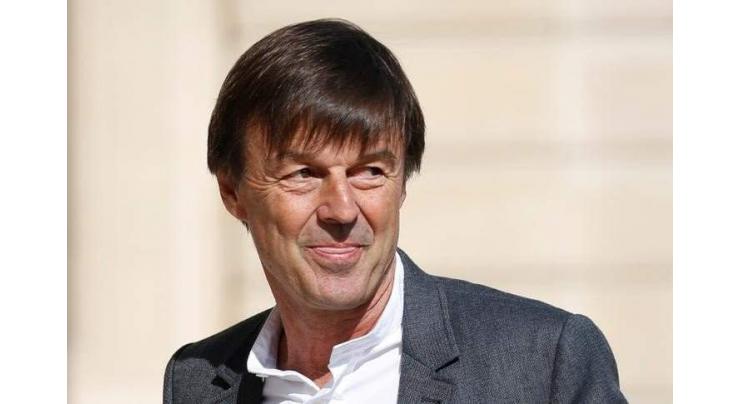
- Home
- World
- News
- French Environmental Policies Fail to Progress Over Pressure From Industrial Lobby - NGO
French Environmental Policies Fail To Progress Over Pressure From Industrial Lobby - NGO
Mohammad Ali (@ChaudhryMAli88) Published September 04, 2018 | 12:44 AM

The recent resignation of French Ecology Minister Nicolas Hulot has brought to light the issue of French environmental policies being heavily guided by powerful industrial lobbies and their economic interests, Charlotte Mijeon, the spokeswoman of the Sortir du Nucleaire association of anti-nuclear groups, told Sputnik on Monday.
MOSCOW (UrduPoint News / Sputnik - 04th September, 2018) The recent resignation of French Ecology Minister Nicolas Hulot has brought to light the issue of French environmental policies being heavily guided by powerful industrial lobbies and their economic interests, Charlotte Mijeon, the spokeswoman of the Sortir du Nucleaire association of anti-nuclear groups, told Sputnik on Monday.
Hulot announced his resignation last Tuesday. The minister said he felt alone in promoting ecology-related goals and could not pretend that his presence in the government helped to promote environment objectives. Hulot claimed he had "influence, but not power" and slammed the presence of lobbies in the French power circles. The minister's sudden resignation was reportedly provoked by a new initiative by French President Emmanuel Macron to relax hunting quotas amid pressure from the pro-hunting lobby.
"As far as climate action in France is concerned, there is a lot of talking, and little action. What Hulot denounced is that divergence between the discourse and the action, and the ability of the industrial lobby to exercise its power and to impose climate, ecological and energy policy, which does not live up to what it should be like," Mijeon said.
The activist noted that certain enterprises and lobbies enjoyed favoritism of the government in France. In particular, the agricultural sector widely used pesticides despite their harmful effect on the ecology, and the pro-hunting lobby managed to promote their initiatives due to the government's support.
The use of nuclear energy was also upheld by the government despite France's plans to reduce the share of nuclear power in its energy mix, Mijeon argued.
"Nicolas Hulot, who wanted to change things, came to understand that it's not the Ecology Ministry that can make decisions. He understood that [President] Emmanuel Macron's government does not make ecology its priority," Mijeon pointed out.
The campaigner noted that the current French government upheld environment projects only when it needed to raise the level of approval and support of the public.
The NGO hoped that Hulot's resignation under the words 'it's impossible to act because it's the economic interests which dictate the politics' would provoke a shock and lead to manifestations, Mijeon added.
Hulot's stepping down is claimed to be a heavy blow to Macron, who has been saying since his inauguration in 2017 that France is in the avant-garde of the fight against climate change. In particular, Macron has blasted US President Donald Trump over US withdrawal from the Paris climate change agreement and organized the UN-affiliated One Planet Summit on climate change.
After Hulot stepped down, 10 French climate NGOs, including Les Amis de la Terre, France Nature Environnement, La Fondation pour la Nature et l'Homme and others, called on Macron to change the French government's stance on its climate policy. The organizations condemned the growing use of pesticides, the reduction of the share of rail transport in favor of constructing new roads, support for nuclear energy and falling behind on the use of renewable sources of energy by the authorities.
Recent Stories

Shayan, Rashid, Junaid to represent Pakistan in U12 Regional Qualifying Jrs

Govt committed to empower youth with modern tech, IT: PM

Olympic Games Paris 2024: How teams qualified

LESCO detects 74,285 power pilferers in 219 days

RTO destroys huge quantity of non-duty paid cigarettes

Rain-windstorm/thunderstorm expected in most parts of country: PMD

Pakistan's total liquid foreign reserves reach $ 13.28 billion

Pakistan to tour New Zealand for 3 ODIs, 5 T20Is next March

ENGRO announces strong results for 1st quarter 2024

RDA inflows rise to $7.660 bn in March 24

US economic growth slows significantly in first quarter

Govt committed to developing gems, jewellery sector: Minister
More Stories From World
-

US economic growth slows significantly in first quarter
4 minutes ago -

Ukraine, Russia exchange fire, at least seven dead
2 hours ago -

155 killed in Tanzania as heavy rains lash East Africa
2 hours ago -

US economic growth slows significantly in first quarter
2 hours ago -

Macron warns 'mortal' Europe needs stronger defence
2 hours ago -

COP29 host says deal on climate aid essential but offers few details
2 hours ago
-
Ukraine jails couple for helping Russia strike hospital
2 hours ago -
Togo opposition asks W.Africa court to overturn reforms
3 hours ago -
Paris landmark Moulin Rouge's windmill sails collapse
3 hours ago -
Ahead of feared Rafah invasion, Palestinians mourn bombardment dead
3 hours ago -
155 killed in Tanzania as heavy rains cause floods, landslides: PM
3 hours ago -
Car giants vie for EV crown at Beijing's Auto China show
3 hours ago





